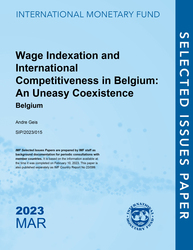
Wage Indexation and International Competitiveness in Belgium: An Uneasy Coexistence: Belgium
Belgium is one of a small group of euro area countries that maintains indexation of wages to inflation as part of its wage setting framework.
READ MORE...
Volume/Issue:
Volume 2023
Issue 015
Publication date: March 2023
ISBN: 9798400235306
$15.00
Add to Cart by clicking price of the language and format you'd like to purchase
Available Languages and Formats
| English |
Prices in red indicate formats that are not yet available but are forthcoming.
Topics covered in this book
This title contains information about the following subjects.
Click on a subject if you would like to see other titles with the same subjects.
Exports and Imports , Inflation , Labor , Economics- Macroeconomics , Money and Monetary Policy , International - Economics , inflation , price setting , collective bargaining , wage formation , wage setting , wage indexation , inflation indexation , international competitiveness , indexation basis , indexation regime , energy price inflation , health index inflation driver , Wages , Energy prices , Global , Baltics
Summary
Belgium is one of a small group of euro area countries that maintains indexation of wages to inflation as part of its wage setting framework. With intensified price pressures since late 2020 driving inflation to record levels, the tension between compensating workers for purchasing power losses while maintaining international competitiveness have again been highlighted. To improve the performance and viability of the current setup, several avenues of reform could be envisaged. In particular, the scope for excluding price increases in highly volatile components, like energy and food, from the indexation basis should be explored to less the need to restore competitiveness by prolonged periods of real wage restraint. Moreover, options to widen the flexibility of the indexation regime should be contemplated to alleviate the burden of firms at times of large and multiple shocks, thereby also preserving investment and employment. Finally, productivity trends should also be accounted for to capture deviations of labor costs between Belgium and its key export markets.
Copyright © 2010 - 2026
Powered by:
AIDC



